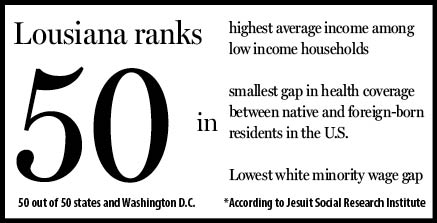Louisiana ranks low in social justice report

January 28, 2020
A recent report from the Loyola’s Jesuit Social Research Institute identifies Louisiana as the weakest state concerning matters of social justice. This was Louisiana’s third appearance at the bottom.
The JustSouth Index report is calculated using nine measurable indicators that are based on issues such as poverty, racial disparity and immigrant exclusion. Louisiana scored poorly in most of these indicators, falling lowest in issues of poverty and racial disparity, according to the report.
“I think poverty is one of the main drivers of racial disparities in Louisiana,” Race and Racism Research Fellow Nicholas E. Mitchell said.
Mitchell explained that poverty is also generating challenges in nonwhite and immigrant communities in the areas of wealth, health outcomes and adult education.
A main contributor to the report, Dennis Kalob, also attributed Louisiana’s low ranking to economic indicators.
“Louisiana has the second lowest average income among all low-income households,” he said. “We also have the second largest white-minority wage gap (controlling for age, level of education and occupation).”
The state’s current legislation plays a substantial role in these economic and racial disparities as Louisiana is one of the few states that still upholds the federal minimum wage of $7.25 per hour.
After comparing wages and factors with other states, Kalob believes rejecting an increase in minimum wage is significantly hurting Louisiana and its residents.
“Of the 10 states at the bottom of the Index, seven had a minimum wage of $7.25 and one other state was just a few cents higher. Of the top 10 states in our Index, seven of them had a minimum wage of $9 or higher,” he said.
Mitchell also supports the increase of minimum wage as a solution to repair racial disparities and decrease poverty.
“Raising the minimum wage to a living wage would have a profound impact on the standard of living for many of Louisiana’s poor, regardless of race,” Mitchell said.
Along with increasing the minimum wage, Mitchell and Kalob agree that making changes to education would help mend issues of poverty and racial disparities as well.
“Increasing access to early childhood education would also improve educational attainment, which in turn lowers poverty rates,” Mitchell said.
Legislation increasing state-funded education and providing resources to educate residents about healthcare and financial assistance benefits would be an ideal way for the state to improve their standing on social justice, according to Kalob.
As for the Loyola community, Mitchell urges that we advocate for social justice and implement change on our campus.
“This requires defending policies and programs that promote social justice but also going on the offensive against policy and programs that hinder social justice,” he said.






